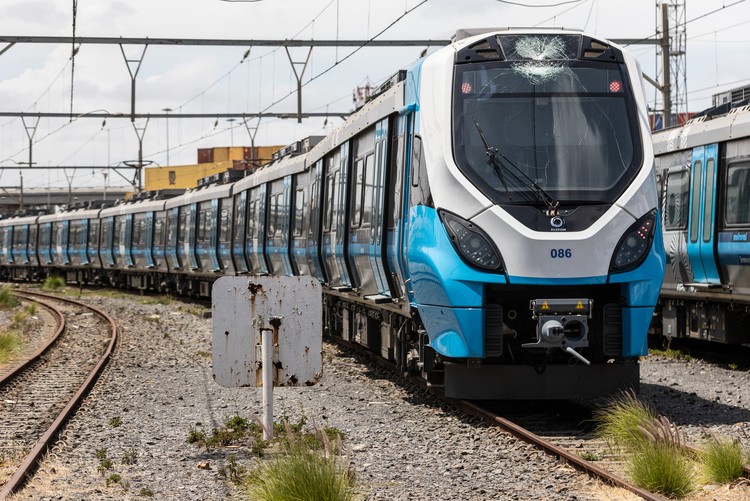
15 August 2023
The City of Cape Town wants a greater role in the running of the city’s train service. Archive photo: Ashraf Hendricks
An intergovernmental dispute will be declared by the City of Cape Town against the Passenger Rail Agency of South Africa (PRASA) if President Cyril Ramaphosa does not respond to a request to create a joint working committee on rail devolution by 31 August.
This is according to a statement released by Cape Town Mayor Geordin Hill-Lewis on Monday, and comes after numerous attempts by the City to negotiate a Service Level Agreement with PRASA, which runs Metrorail.
The need for a properly functioning train service in Cape Town was underlined by last week’s deadly taxi strike in which five people were killed and Golden Arrow buses, private vehicles and public infrastructure were torched, while commuters were stranded and unable to get home or to work.
The strike “demonstrated the urgent need for a safe, affordable passenger rail system”, stated Hill-Lewis.
According to the City’s latest Comprehensive Integrated Transport Plan, of the 33% of Cape Town commuters who rely on public transport, 67% use minibus taxis and just 6% use rail, which is a 95% decline in rail users since 2012. The remaining 27% use bus services such as Golden Arrow or MyCiTi.
As a result, when minibus taxi umbrella organisation SANTACO announced a strike at about 2pm on Thursday 3 August, thousands of people had to walk up to 30km to get home, while some slept overnight at the Cape Town taxi rank.
In the face of PRASA’s failure to maintain and manage its rail service, the City wants to run it, as envisaged in the Land Transport Act.
A Service Level Agreement with PRASA would form the foundation of “the long-awaited devolution of rail” to the City, states Hill-Lewis, allowing the metropolitan municipality to ensure a safe, reliable and affordable rail service. He has previously stated that a Service Level Agreement with PRASA is legally required by the National Land Transport Act, but repeated requests to PRASA to comply have been snubbed.
This is despite Cabinet passing the White Paper on National Rail Police in May 2022, which commits to devolving rail to capable metros, and to producing a Rail Devolution Strategy in 2023.
Yet in May, transport minister Sindisiwe Chikunga rebuffed the City’s plans to take over passenger rail services.
GroundUp has seen at least four letters from City officials since January asking PRASA to negotiate an agreement, with a draft agreement already compiled by the City. However, according to Hill-Lewis, PRASA in late July stated they would not sign a binding Service Level Agreement “given the current state of rail services”.
This comes after a non-binding memorandum of understanding was entered into between the City and PRASA in 2015.
Without a Service Level Agreement, there is no commitment to the quality and level of rail service PRASA would deliver, and the ability to be held accountable to those commitments.
Hill-Lewis stated he has called on Ramaphosa to urgently set up a joint working committee on rail devolution, “given the National Transport Director-General’s public commitment to gazetting a Rail Devolution Strategy within 2023”.
He said this comes after a request for a joint committee sent more than two months ago had met with no response. The City wants to provide input to the strategy and “settle plans to devolve rail in Cape Town”.
Should Ramaphosa not respond by 31 August, Hill-Lewis said the City would initiate intergovernmental dispute mediation proceedings.
“Passenger rail must be the backbone of our network, but it has all but collapsed while PRASA refuses to be held accountable for improving service levels to the public. All spheres of government have a duty to fix this situation without delay.”
The City’s ongoing rail feasibility study, which examines how devolving the current Metrorail system to City management, calculates lower income households would save up to R932-million per year if there was an efficient passenger rail service in Cape Town. Properly functioning rail would sustain 51,000 jobs and add R11-billion to the local economy per year, according to the study.
“It is vital that PRASA’s service delivery is measurable, with clear, agreed targets for improvement as we work towards our ultimate goal of the devolution of passenger rail to the City,” stated Mayco Member for Urban Mobility, Roberto Quintas.
He said PRASA was initially willing to discuss a service level agreement but had done an “about-turn”.
“Given the sorry state of passenger rail, it seems PRASA’s rationale is that they are not in a position to commit to even basic performance criteria at this stage.”
Quintas said PRASA was instead proposing a Memorandum of Understanding be developed, but this would not be binding, and PRASA had not upheld its commitments contained in an existing Memorandum of Understanding signed in 2015.
Questions sent to PRASA on 10 August related to the reasons for not negotiating a service level agreement with the City of Cape Town, received no response.